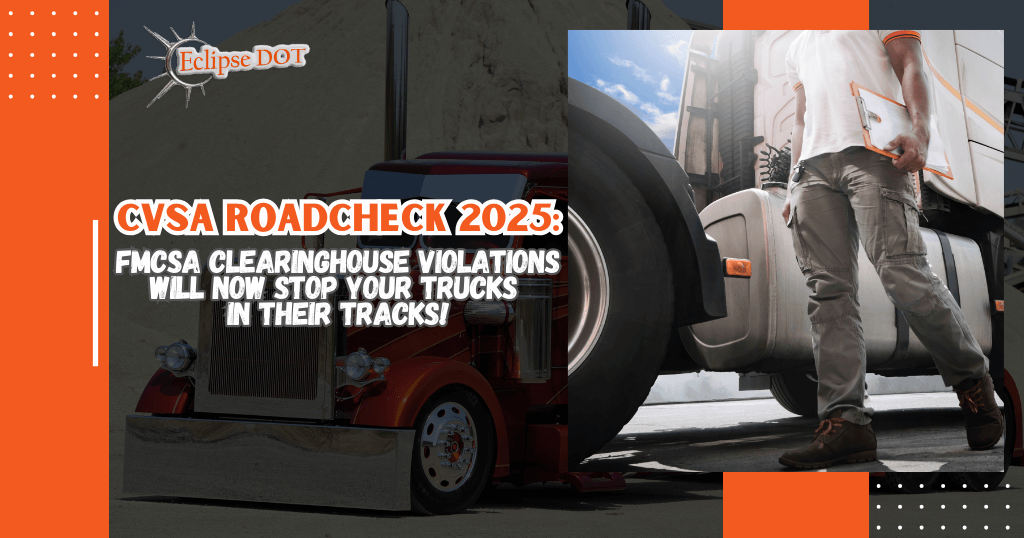Every year, the CVSA International Roadcheck sends waves through the trucking industry. Over the course of 72 hours, thousands of commercial vehicles across the United States, Canada, and Mexico face roadside inspections designed to identify compliance failures. But in 2025, enforcement takes an even tougher turn.
For the first time, FMCSA Clearinghouse violations will be part of roadside inspections. While brakes, lights, logbooks, and other compliance checks remain critical, CVSA inspectors now have real-time access to Clearinghouse records at roadside stops.
A prohibited driver in the system leads to immediate consequences. Officers will pull them from service on the spot, and companies will be forced to park that truck until a replacement driver arrives.
Operations will grind to a halt. Deliveries will be delayed. Revenue will take a hit.
This isn’t just a paperwork issue—it’s an operational disaster waiting to happen. Any fleet failing to run frequent Clearinghouse queries risks falling into this compliance trap.
FMCSA Clearinghouse: The Compliance Risk That Just Became a Roadside Priority
The FMCSA Drug & Alcohol Clearinghouse, launched in January 2020, exists to keep CDL drivers with drug or alcohol violations off the road. Before its implementation, drivers who failed drug tests could jump between carriers unnoticed, slipping through the system.
Now, when a driver fails or refuses a test, FMCSA logs that violation immediately. Until they complete the return-to-duty process, they cannot legally operate a commercial vehicle.
Fleets must:
✔ Check the Clearinghouse before hiring a CDL driver
✔ Run a query on all active drivers at least once per year
That system sounds good in theory, but here’s the problem: a lot can happen between those annual checks.
The Dangerous Compliance Gap That CVSA Plans to Close
Annual Clearinghouse checks leave large compliance blind spots. Consider this scenario:
A company runs its yearly query in January 2025. Everything looks fine. However, in March, one of its drivers fails a random drug test.
Without another Clearinghouse check until January 2026, the company remains unaware of that violation. That driver continues operating illegally for months—until CVSA catches them during Roadcheck 2025.
Starting this year, CVSA inspectors will have real-time access to the Clearinghouse database. If they identify a prohibited driver, the officer will remove them from service immediately.
At that point, the company loses control. The driver is out, the truck is sidelined, and the shipment sits idle until a relief driver arrives.
A situation like this doesn’t just disrupt schedules—it damages CSA scores, increases insurance rates, and raises the risk of audits.
Immediate Consequences of a Clearinghouse Violation During an Inspection
Once an inspector flags a prohibited driver, here’s what happens next:
🚛 Driver is removed from service—Without completing the FMCSA return-to-duty process, they cannot legally drive.
🚛 The truck remains parked—Until a relief driver arrives, that shipment isn’t moving.
🚛 CSA scores drop—Higher violation counts bring greater audit risks and increased insurance premiums.
🚛 Deliveries fall behind schedule—Frustrated customers, financial losses, and a damaged reputation follow.
None of this is hypothetical—it’s exactly what will happen if companies fail to monitor their drivers properly. However, proactive fleets can prevent this disaster.
What Else Is CVSA Targeting in 2025?
Although Clearinghouse violations will receive special attention, CVSA inspectors will continue cracking down on other common violations.
1. Hours of Service Compliance (RODS Checks)
HOS violations remain one of the most common reasons for out-of-service orders. Inspectors will check:
✔ Logbook accuracy—Any discrepancies or falsifications result in violations.
✔ On-duty limits—Drivers exceeding legal limits will be pulled from service.
2. Tire Condition & Inflation
Inspectors will also focus on tire safety, which is a leading cause of truck crashes. They will look for:
✔ Tread depth violations—Tires below the legal limit will sideline a truck.
✔ Underinflation or visible damage—Cracked, bulging, or low-pressure tires won’t be tolerated.
Last year, nearly 20% of inspected trucks and drivers were placed out of service. This year, that number could climb even higher.
How to Keep Your Fleet Rolling During Roadcheck 2025
Compliance isn’t just about avoiding fines. It’s about keeping trucks moving, drivers working, and customers satisfied. Those who take a wait-and-see approach often find themselves facing operational chaos.
The best strategy? Fix compliance issues before inspectors find them.
1. Increase FMCSA Clearinghouse Query Frequency
A single annual query leaves fleets vulnerable to unexpected violations. Instead, companies should run quarterly or even monthly Clearinghouse queries. More frequent checks allow companies to detect problems before CVSA does.
Identifying issues early prevents roadside shutdowns, delays, and operational headaches.
2. Get the Right Driver Permissions
Clearinghouse queries fall under Fair Credit Reporting Act (FCRA) and Privacy Act protections. Companies must obtain driver consent before running these checks.
🚛 Limited queries require ongoing consent.
🚛 Full queries need individual approvals for each request.
Failing to obtain proper permissions doesn’t just create paperwork issues—it introduces a new compliance risk that could result in fines.
At Eclipse DOT, we manage Clearinghouse compliance for fleets, ensuring all queries follow FMCSA regulations.
3. Prepare for a Full Inspection, Not Just the Clearinghouse Check
Even if drivers pass Clearinghouse queries, CVSA inspectors will still look for other violations. Preparing every aspect of compliance prevents unnecessary downtime.
Fleet managers should:
✔ Verify log accuracy—Ensure records align with HOS regulations.
✔ Check tire conditions—Tires must meet FMCSA safety standards.
✔ Ensure vehicle maintenance is up to date—Avoid mechanical issues before they become violations.
Why Eclipse DOT? Because Compliance Shouldn’t Be a Guessing Game
FMCSA compliance can be overwhelming. One mistake can cost thousands in fines, lost revenue, and customer trust. At Eclipse DOT, we handle the compliance details so fleet managers can focus on keeping their trucks moving.
How We Help Fleets Avoid Roadcheck Disruptions:
🚛 Clearinghouse Compliance Management – We track driver statuses, manage queries, and ensure full compliance before inspectors do.
🚛 DOT Compliance Audits – Our team reviews records, logs, and vehicle files so fleets are always inspection-ready.
🚛 DOT Safety Training – Drivers learn exactly what to expect during inspections, reducing violations.
🚛 Full-Service Compliance Support – FMCSA rules change frequently. We keep fleets compliant, no matter what.
Most Fleets Get Caught Off Guard. Yours Doesn’t Have To.
Many companies assume they’re FMCSA compliant—until an inspector proves otherwise. By that time, it’s too late.
Instead of reacting to violations, stay ahead of them.
The Bottom Line: Get Ahead of CVSA Roadcheck 2025—Or Get Sidelined
This year’s Roadcheck isn’t just an inspection—it’s a compliance test for every fleet on the road. Companies that fail to prepare will suffer downtime, lost revenue, and compliance penalties. The ones that proactively address potential violations will keep their operations running smoothly.
Two options:
🚛 Be proactive. Identify and resolve compliance risks before CVSA does. Keep trucks moving and deliveries on time.
🚛 Be reactive. Wait until an inspector sidelines your fleet, leaving you scrambling for solutions.
Which choice will you make?
Gain exclusive access to our CDL & DOT Compliance articles with a trial at DOTDocs.com. And don’t forget to claim your FREE micro audit at THE ECLIPSE DOT MICRO AUDIT. Ready for seamless operations? Discover the difference today!
📚 Sources & Further Reading
🔹 CVSA Roadcheck 2025 Announcement
🔹 CVSA Inspection Focus on Tires & RODS
🔹 FMCSA Clearinghouse Compliance Updates


